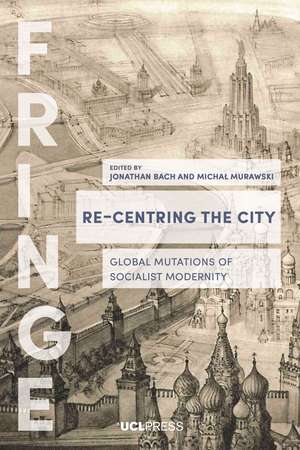Re-Centring the City: Urban Mutations, Socialist Afterlives and the Global East: FRINGE
Editat de Jonathan Bach, Michal Murawskien Limba Engleză Paperback – 4 apr 2020
By drawing our attention back to the center as an object of analytical and empirical study, this book counters a long-term trend in both planning and urban scholarship that emphasizes decentralization as the hallmark of the twenty-first-century city. It argues that such a “centrifugal” turn in urban studies is neither empirically accurate nor normatively incontestable, especially when one looks beyond the West. Rather, as the contributions to this volume show, decentering obscures the ways in which the center continues to exert a powerful influence on cities of today. The concise chapters, situated at the intersection of urban studies, social anthropology, architecture, and art theory, provide new perspectives on the role of the center in defining the city’s terrain. Together, they constitute a collection of sharp, provocative interventions into debates about the transformation of global urban forms in the twenty-first century.
Preț: 202.64 lei
Nou
Puncte Express: 304
Preț estimativ în valută:
38.78€ • 40.57$ • 32.21£
38.78€ • 40.57$ • 32.21£
Carte indisponibilă temporar
Doresc să fiu notificat când acest titlu va fi disponibil:
Se trimite...
Preluare comenzi: 021 569.72.76
Specificații
ISBN-13: 9781787354128
ISBN-10: 1787354121
Pagini: 264
Ilustrații: 140 color plates
Dimensiuni: 235 x 159 x 25 mm
Greutate: 0.56 kg
Editura: UCL Press
Colecția UCL Press
Seria FRINGE
ISBN-10: 1787354121
Pagini: 264
Ilustrații: 140 color plates
Dimensiuni: 235 x 159 x 25 mm
Greutate: 0.56 kg
Editura: UCL Press
Colecția UCL Press
Seria FRINGE
Notă biografică
Jonathan Bach is professor of global studies at the New School in New York. He is the author, most recently, of What Remains and coeditor of Learning from Shenzhen. Michał Murawski is assistant professor of critical area studies at the School of Slavonic and East European Studies, University College London. He is the author of Palace Complex.
Cuprins
I. Moscow, Point of Departure
1. Centre and Periphery: A Personal Journey
Vladimir Paperny
2. Fortress City: The Hegemony of the Moscow Kremlin and the Consequences and Challenges of Developing a Modern city Around a Medieval Walled Fortress
Clementine Cecil
3. Appropriating Stalinist Heritage: State Rhetoric and Urban Transformation in the Repurposing of VDNKh
Andreas Schonle
4. The City Without a Centre: Disurbanism and Communism Revisited
Owen Hatherley
5. Mutant Centralities: Moscow Architecture in the Post-Soviet Era
Dasha Paramonova
II. Off Centre: Palatial Peripheries
6. Berlin’s Empty Centre: A Double Take
Jonathan Bach
7. Phantom Palaces: Prussian Centralities, and Humboldtian Spectres
Khadija von Zinnenburg Carroll and Jonas Tinius
8. Palatial Socialism, or (Still-)Socialist Centrality in Warsaw
Michal Murawski
III. Looking Inward: Re-Centring the Sacred
9. The Architecture of the Seventh Day: Building the Sacred in Socialist Poland
Kuba Snopek with Izabela Cichonska and Karolina Popera
10. Post-Shtetl: Spectral Transformations and Architectural Challenges in the Periphery’s Bloodstream
Natalia Romik
11. Eat, Pray, Shop! The Mosque as Centrum in the Swedish Suburbs
Jennifer Mack
IV. Looking Upward: Power Verticals
12. Verticality and Centrality: The Politics of Contemporary Skyscrapers
Steve Graham
13. Partitioning Earth and Sky: Vertical Urbanism in Post-Socialist Mumbai
Vyjayanthi Rao Venuturupalli
14. Vertical Horizons: The Shadow of The Shard
Thomas Wolseley
V. Looking Outward: Hinterlands, Diffusions, Explosions
15. New Geographies of Hinterland
Pushpa Arabindoo
16. De-Escalating the Centre: Urban Futures and Special Economic Zones beyond Poststructuralism’s Neoliberal Imaginations
Patrick Neveling
17. Explosion, Response, Aftermath
Joy Gerrard
VI. Things Fall: (After)Lives of Monumentality
18. Domestic Monumentality: Scale of Relationship in the Modern City
Adam Kaasa
19. On an Alleged Thought of Inflicting Harm to a Lenin Statue
Oleksyi Radinsky
20. We’re Losing Him! On Monuments to Lenin and the Cult of Demolition in Present-Day Ukraine
Yevgenia Belorusets
1. Centre and Periphery: A Personal Journey
Vladimir Paperny
2. Fortress City: The Hegemony of the Moscow Kremlin and the Consequences and Challenges of Developing a Modern city Around a Medieval Walled Fortress
Clementine Cecil
3. Appropriating Stalinist Heritage: State Rhetoric and Urban Transformation in the Repurposing of VDNKh
Andreas Schonle
4. The City Without a Centre: Disurbanism and Communism Revisited
Owen Hatherley
5. Mutant Centralities: Moscow Architecture in the Post-Soviet Era
Dasha Paramonova
II. Off Centre: Palatial Peripheries
6. Berlin’s Empty Centre: A Double Take
Jonathan Bach
7. Phantom Palaces: Prussian Centralities, and Humboldtian Spectres
Khadija von Zinnenburg Carroll and Jonas Tinius
8. Palatial Socialism, or (Still-)Socialist Centrality in Warsaw
Michal Murawski
III. Looking Inward: Re-Centring the Sacred
9. The Architecture of the Seventh Day: Building the Sacred in Socialist Poland
Kuba Snopek with Izabela Cichonska and Karolina Popera
10. Post-Shtetl: Spectral Transformations and Architectural Challenges in the Periphery’s Bloodstream
Natalia Romik
11. Eat, Pray, Shop! The Mosque as Centrum in the Swedish Suburbs
Jennifer Mack
IV. Looking Upward: Power Verticals
12. Verticality and Centrality: The Politics of Contemporary Skyscrapers
Steve Graham
13. Partitioning Earth and Sky: Vertical Urbanism in Post-Socialist Mumbai
Vyjayanthi Rao Venuturupalli
14. Vertical Horizons: The Shadow of The Shard
Thomas Wolseley
V. Looking Outward: Hinterlands, Diffusions, Explosions
15. New Geographies of Hinterland
Pushpa Arabindoo
16. De-Escalating the Centre: Urban Futures and Special Economic Zones beyond Poststructuralism’s Neoliberal Imaginations
Patrick Neveling
17. Explosion, Response, Aftermath
Joy Gerrard
VI. Things Fall: (After)Lives of Monumentality
18. Domestic Monumentality: Scale of Relationship in the Modern City
Adam Kaasa
19. On an Alleged Thought of Inflicting Harm to a Lenin Statue
Oleksyi Radinsky
20. We’re Losing Him! On Monuments to Lenin and the Cult of Demolition in Present-Day Ukraine
Yevgenia Belorusets











